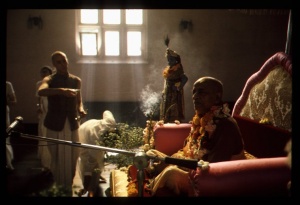CC Antya 6.294 (1975)

A.C. Bhaktivedanta Swami Prabhupada
TEXT 294
- prabhu kahe,--"ei śilā kṛṣṇera vigraha
- iṅhāra sevā kara tumi kariyā āgraha
SYNONYMS
prabhu kahe—Śrī Caitanya Mahāprabhu said; ei śilā—this stone; kṛṣṇera vigraha—the form of Lord Kṛṣṇa; iṅhāra—of this; sevā—worship; kara—do; tumi—you; kariyā āgraha—with great eagerness.
TRANSLATION
Śrī Caitanya Mahāprabhu instructed Raghunātha dāsa, "This stone is the transcendental form of Lord Kṛṣṇa. Worship the stone with great eagerness."
PURPORT
Śrīla Bhaktisiddhānta Sarasvatī Ṭhākura writes in his Anubhāṣya that in the opinion of Śrī Caitanya Mahāprabhu, the govardhana-śilā, the stone from Govardhana Hill, was directly the form of Kṛṣṇa, the son of Mahārāja Nanda. The Lord used the stone for three years, and then in the heart of Raghunātha dāsa the Lord awakened devotional service to the stone. The Lord then gave the stone to Raghunātha dāsa, accepting him as one of His most confidential servants. However, some envious people conclude that because Raghunātha dāsa had not taken birth in the family of a brāhmaṇa, Śrī Caitanya Mahāprabhu did not give him the right to worship the Deity directly, but instead gave him a stone from Govardhana. This kind of thought is nārakī, or hellish. As stated in the Padma Purāṇa, arcye viṣṇau śilādhīr guruṣu nara-matir vaiṣṇave jāti-buddhiḥ. ..yasya vā nārakī saḥ: "One who considers the arcā-mūrti (the worshipable Deity of Lord Viṣṇu) to be stone, the spiritual master to be an ordinary human being, or a Vaiṣṇava to belong to a particular creed is possessed of hellish intelligence." If one thinks that the worshipable śālagrāma-śilā is a mere stone, that the spiritual master is an ordinary human being or that a pure Vaiṣṇava preaching the bhakti cult all over the world is a member of a particular caste or material division of society, he is considered a nārakī, a candidate for hellish life. When Śrī Caitanya Mahāprabhu instructed that the govardhana-śilā, the stone taken from Govardhana, is nondifferent from the body of Śrī Kṛṣṇa, the Supreme Personality of Godhead, He indirectly advised such foolish persons that one should not be envious of a Vaiṣṇava who belongs to a different caste or sect. One should accept a Vaiṣṇava as transcendental. in this way one can be saved; otherwise, one is surely awaiting a hellish life.